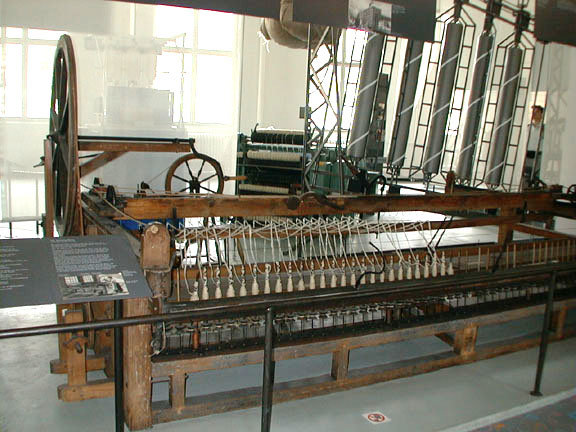Sigfried Gideon pointed half a century ago out that although the beginnings of mechanization and the modern factory first appear in French silk weaving, "to carry through the mechanizing of production, another class of inventors, another class of doers" (37) proved necessary:
Silk was a luxury textile for a luxury class. The English experimented with cotton from the start, and constructed all their machines with cotton in mind. Here was the road to mass production. And just as the textile itself was rougher, of a rougher fibre too was the social class and the environment that pushed forward its mechanization.
Here the inventors were neither nobles or savants. No academy published their experiments, and today's knowledge of the beginnings has to be pieced togther from fragments. No government set up privileged factories: mechanizing of production began in the North, in Lancashire, far from the ruling classes and the High Church of England. Lonely spots like Manchester — which did not attain corporate status before the nineteenth century and was without hampering guild restrictions — and a proletarian class of inventors were needed. [37]
As examples of such "a proletarian class of inventors," Gideon cites several major examples: John Wyatt, who "stretched the yarn between pairs of revolving cylinders instead of by hand" in the 1740s, ended up in debtor's prison. James Hargreaves, who invented the spinnning jenny in the following decade, was "a poor weaver." And Richard Arkwright, "the first successful cotton spinner," began as a poor barber.

James Hargreaves's Spinnning Jenny. [Click on the image for larger picture.]
How accurately does British art and literature recognize these class origins of the Industrial Revolution? Can you think of a novel that emphasizes the working-class origins of either inventors or industrialists? any that mentions their middle-class origins?
Related Materials
- Sir Robert Peel's Family Origins
- Textile Manufacture and the Industrial Revolution (sitemap)
- The Industrial Revolution, Textiles, and Empire
References
Gideon, Sigfried. Mechanization Takes Command: A Contribution to Anonymous History. New York: Norton, 1969.
Last modified 26 November 2000